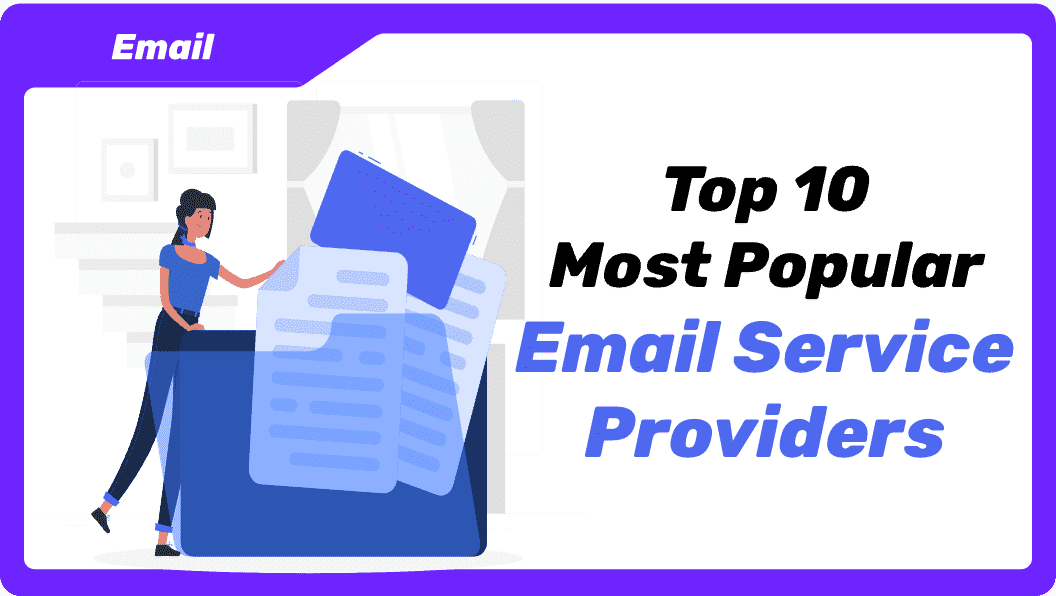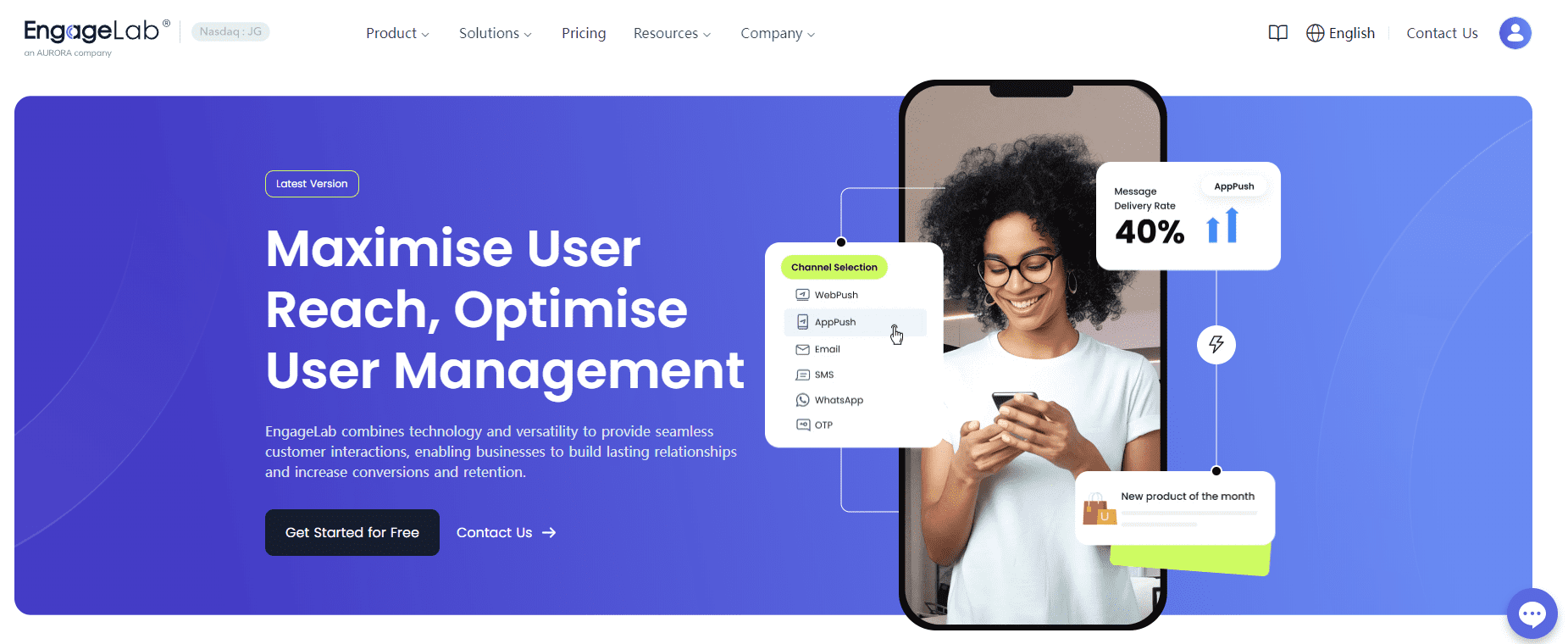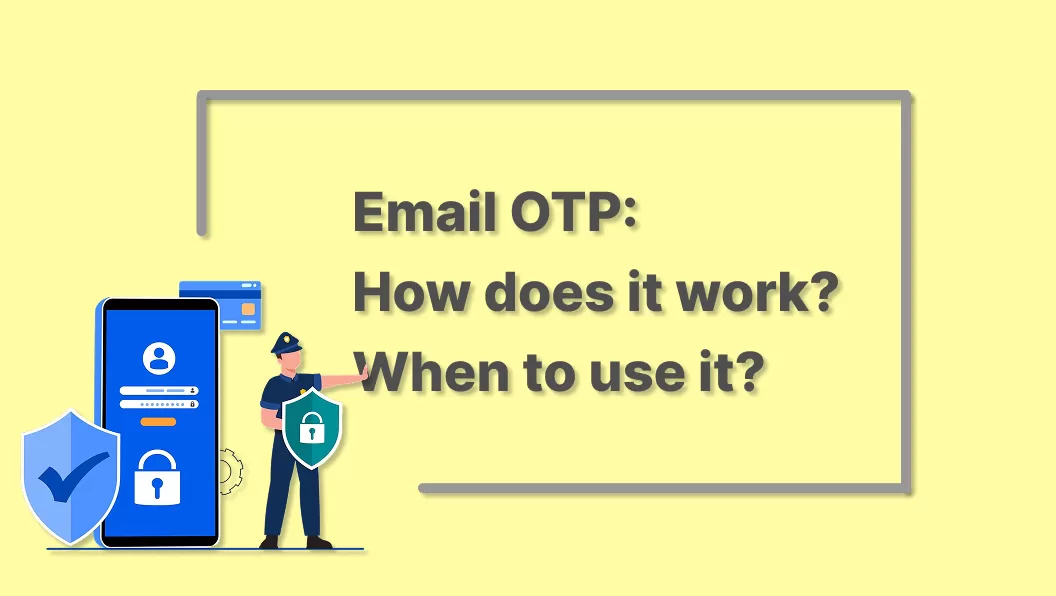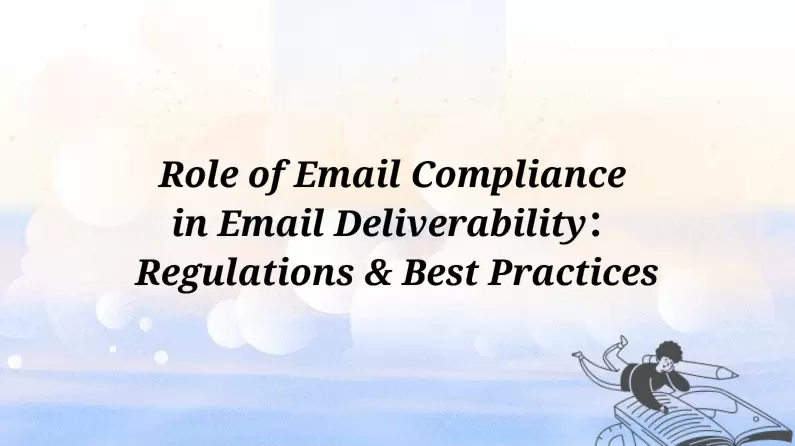Struggling to choose an email service provider? With so many options available, we get how overwhelming it can be. Don't stress—we've rounded up the top 10 email service providers for 2026 . Whether you are a small business owner, a marketer, or any other person who requires a good email solution, we have got you covered. We will break down its features, pros, and cons, which make your decision a breeze.
So let's get started.

What is an Email Service Provider(ESP)?
Before getting straight to the top email service providers, it's essential to first understand who they are and how they can help in marketing.
An Email service providers lets you send, receive, and manage emails—but it’s far more than just a sending tool. Think of it as an all-in-one solution with list management, automation, analytics, and other powerful features.
So, What Can ESPs Do With Your Marketing?
Think of them as a center hub, not just for anything email-related. It helps you plan and send out campaigns that are focused, where you've segmented the audience to ensure that every individual gets the most personalized message, doing so with very detailed analytics, hence one can easily automate workflows for time-saving and raising efficacy.
Essentially, an ESP empowers you to talk to your audience in a meaningful manner that gives them engagement, nurtures leads, and finally, at the end of the day, experiences business growth.
Now that you have a clear idea of what is an Email Service Provider and how you can go about using it to fuel all of your marketing efforts, let's get into the best options for 2026.
Top 10 Business Email Service Providers 2026
As you might be aware, today many email service providers are entering the market, and therefore it becomes really difficult for the users to make a choice. First, you will have to experiment with many options so that finally you can zero in on the right option, which is very costly and also quite time-consuming.
So, to make this easy for you, the top 10 business email service providers have been listed that you can use in 2026.
Guide: Top 10 Email Service Providers Comparison
| Provider | Key Strengths | Best For | Free Plan |
|---|---|---|---|
| EngageLab | ★★★★★ | Enterprise-grade deliverability, 24/7 support | Yes |
| ProtonMail | ★★★★☆ | Military-grade encryption, privacy-focused | Yes |
| Zoho Mail | ★★★★☆ | Affordable business suite integration | Yes |
| Tutanota | ★★★★☆ | Fully encrypted (even subject lines) | Yes |
| Gmail | ★★★★☆ | Best free tier, AI-powered features | Yes |
| Outlook | ★★★★☆ | Best Microsoft 365 integration | Yes |
| Yahoo Mail | ★★★☆☆ | Massive free storage (1TB) | Yes |
| iCloud Mail | ★★★☆☆ | Seamless Apple device sync | Yes |
| AOL Mail | ★★☆☆☆ | Simple for basic needs | Yes |
| GMX Mail | ★★☆☆☆ | Large file attachments | Yes |
Let us elaborate on them even more.
1. EngageLab
EngageLab is a full-featured email service provider specializing in high deliverability and advanced email marketing tools.If you do not know what is email deliverability and how to master it, you can read this article Unlocking Email Deliverability: Strategies for Success .
Their platform assists enterprises in establishing essential email authentication standards such as SPF, DKIM, and DMARC, which are crucial for improving email delivery rates.

As one of the leading email service providers, EngageLab delivers exceptional high-speed email delivery, ensuring time-sensitive communications reach recipients instantly without delays. This capability makes it a top choice among best email security service providers for businesses prioritizing reliable transactional and marketing emails.
Get Started For FreeIntelligent Behavioral Analytics: Our sophisticated tracking provides actionable insights into recipient engagement patterns, enabling precise optimization of campaigns - a must-have feature for email service providers for marketing.
Enterprise-Grade Protection: Security and privacy are also paramount, with EngageLab offering features like data desensitization and two-factor authentication to protect sensitive information.
Unmatched Reliability: The platform's high stability is reflected in its impressive uptime statistics and the provision of round-the-clock customer support, ensuring that businesses have reliable access to their services at all times.
☆ Service Targets:
- Businesses that wish to improve their email deliverability.
- Companies that require email delivery at high speeds.
- Companies needing more advanced behavioral analytics for their email marketing efforts.
- Companies who are looking for a professional email delivery service with high security and stability.
Pros
Industry-leading deliverability with worldwide coverage.
Integration of an API and SDK for Developers.
24/7 Professional support and Service Stability.
-
Providing adaptive emails using derived insights on strategies that can be used for receiving mail.
-
Full-featured blacklist filtering mechanism to minimize the number of delivered messages at invalid addresses.
Cons
Some features may require technical expertise to use effectively.
Probable Costs to Small Businesses.
Very minute user experience information is available online.
2. ProtonMail

ProtonMail stands out as a premier email service provider, renowned for its steadfast commitment to security and privacy. Founded in 2013 by scientists from CERN, ProtonMail is headquartered in Switzerland, a country celebrated for its strong privacy laws, which extend to the digital realm.
Service Targets:
- Ideal for security-focused users and organizations prioritizing privacy.
- Users who need a mailing service that adheres strictly to Swiss privacy laws.
- Those favoring open-source software and private security audits.
- Those that require integration with other secure communication tools.
Pros
Encrypted Email Communications – End-to-End.
No-knowledge encryption.
Independently carried out Platform Security Audit.
De-identification of IP addresses in email messages for user de-identification.
Offers only a few features for free.
-
Features that allow users to send e-mails to non-users with messages that are automatically destroyed either after.
-
You'll also get access to the other Proton services: Proton VPN, Proton Drive, and Proton Calendar.
Cons
The email subject line is not encrypted, which could bring some privacy concerns.
-
New accounts may require personal information for verification, which might be off-putting for some users seeking total anonymity.
-
Some limitations are imposed on the free tier in a manner that the user would be motivated to convert to paid plans to access the complete functionality.
3. Zoho Mail

Zoho Mail is a versatile email service provider that caters to a diverse clientele, ranging from individuals and small businesses to large enterprises. It offers a user-friendly interface and a host of features designed to enhance email communication and productivity.
Service Targets:
- Small to medium-sized businesses looking for an affordable email solution.
- Organizations requiring integration with a broader suite of business applications.
- Users who prioritize privacy and data protection in their email communications.
- Teams seeking collaboration tools within their email platform.
Pros
Offers a generous free tier suitable for small teams.
Ensures data privacy with GDPR compliance and two-factor authentication.
Provides integration with the extensive Zoho suite of applications.
Features an ad-free user experience, even on the free tier.
-
Supports extensive customization options to tailor the service to specific business needs.
Includes advanced search and filter capabilities for efficient email management.
Cons
-
The free tier has limitations that may necessitate upgrading to a paid plan for full functionality.
-
Some users may find the interface less intuitive compared to other popular email services.
-
Customer support response times can vary, potentially impacting the resolution of urgent issues.
4. Tutanota

Tutanota is an email service provider that has been gaining attention for its strong emphasis on privacy and security. Founded in 2011 in Germany, Tutanota offers end-to-end encryption for emails, calendars, and contacts, ensuring that user data remains private and secure.
Service Targets:
- Individuals and organizations that prioritize privacy and data security.
- Users looking for an email service that provides end-to-end encryption, including subject lines.
- Those who prefer a service that is not based in a country under the Five Eyes intelligence alliance.
Pros
Strong focus on privacy with end-to-end encryption for all communication.
Free plan available with essential features.
Subject lines are encrypted, providing additional privacy.
Open-source platform, allowing for community verification of security.
Ability to send encrypted emails to non-users.
No IP logging, enhancing user anonymity.
GDPR compliance, ensuring data protection for users within the EU.
Cons
Limited storage space on the free plan.
Some features require a paid plan.
No support for PGP, which might be a drawback for some users.
The interface may not be as user-friendly as some of the more popular email services.
5. Gmail

Gmail, a flagship email service provided by Google, has become synonymous with modern email communication. Launched in 2004, it has evolved into a comprehensive platform that integrates seamlessly with various productivity tools within the Google ecosystem, such as Google Drive, Calendar, and Docs.
Service Targets:
- Individuals and businesses seeking an integrated suite of productivity tools.
- Users who require substantial storage space for emails and attachments.
- Those who value strong spam and malware protection in their email service.
- Organizations that prefer a cloud-based email solution with offline access.
Pros
Generous storage capacity with options for expansion.
Advanced spam and malware filtering.
Seamless integration with Google Workspace applications.
User-friendly interface with powerful search capabilities.
Offline access to emails via a dedicated Chrome extension.
Confidential mode for enhanced control over email content.
Free tier available with essential features.
Cons
Privacy concerns due to data collection and targeted advertising.
The free tier may not meet the needs of users with high email volume.
Integration with third-party applications may be limited compared to other services.
Some users may find the interface less intuitive than traditional email clients.
6. Outlook

Outlook, Microsoft's premier email service, has been a mainstay in the digital communication realm for both personal and professional use. With its integration into the broader Microsoft 365 suite, Outlook provides a seamless experience across email, calendar, and task management.
Service Targets:
- Individual users in need of reliable email and scheduling tools.
- Businesses of all sizes looking for integrated communication solutions.
- Organizations requiring compliance with industry-standard security practices.
- Users who value the integration of email with other Microsoft Office applications.
Pros
Comprehensive integration with Microsoft 365 suite enhances productivity.
Advanced security features to safeguard user data.
The focused inbox feature helps prioritize important emails.
Sweep rules aid in managing and decluttering the inbox.
The search function is highly effective for locating emails and attachments.
Offers both free and premium versions to cater to different user needs.
Calendar and task management are deeply integrated into the email service.
Cons
The extensive features can present a steep learning curve for new users.
The free version includes ads, which can be distracting.
Some advanced features are reserved for premium subscribers.
Integration with non-Microsoft services can be less seamless.
7. Yahoo Mail

Yahoo Mail, one of the pioneering email service providers, has been a significant player in the digital communication landscape since its inception. It offers a user-friendly interface and a variety of features that cater to both personal and professional communication needs.
Service Targets:
- Individual users looking for reliable and extensive email storage.
- Small businesses in need of an easy-to-use email platform with robust features.
- Large corporations seeking an email service with strong search capabilities and integration options.
Pros
Generous storage space allows for extensive email archiving.
Intuitive interface facilitates ease of use and navigation.
Effective spam filters help maintain a clean inbox.
Integration with other Yahoo services enhances the user experience.
Customizable themes and settings allow for a personalized email environment.
-
The search functionality is powerful and user-friendly, aiding in quick retrieval of information.
Cons
The presence of ads can be intrusive and detract from the user experience.
Some users may find the interface less modern compared to newer email services.
Advanced features may be lacking when compared to other leading email providers.
-
Privacy concerns have been raised regarding the scanning of emails for targeted advertising.
8. iCloud Mail

iCloud Mail is an email service provided by Apple as part of its iCloud suite. It offers users an @icloud.com email address and integrates seamlessly with other Apple services and devices. Designed with simplicity and security in mind, iCloud Mail provides users with a reliable platform for managing their emails across various Apple devices such as iPhones, iPads, and Macs.
Service Targets:
- Users who want an email service tightly integrated with their Apple ecosystem.
- Those who prefer a simple and intuitive email interface.
- Individuals looking for a reliable and secure email service.
Pros
Tight integration with other Apple services and devices.
Simple and intuitive interface.
Generous storage space.
Strong emphasis on security and privacy.
Works seamlessly across Apple devices.
Offers features like Mail Drop for sending large attachments.
Cons
Limited customization options compared to other email services.
May not be suitable for users heavily invested in non-Apple ecosystems.
Some advanced features found in other email services may be lacking.
9. AOL Mail

AOL Mail is an email service provided by AOL (America Online). It offers free email addresses with domains like @aol.com and @aim.com, along with various features such as spam filters and virus protection. With its long-standing presence in the email service market, AOL Mail caters to users seeking a simple and user-friendly email experience.
Service Targets:
- Users who have been long-time AOL customers.
- Individuals seeking a straightforward and easy-to-use email service.
- Those looking for basic email functionality without complex features.
Pros
Simple and user-friendly interface.
Offers unlimited storage space.
Effective spam filtering.
Compatible with various email clients and devices.
Provides integration with other AOL services like AIM (AOL Instant Messenger).
Cons
Limited features compared to more modern email services.
Interface may feel outdated to some users.
Less customization options compared to other email providers.
10. GMX Mail

GMX Mail is a free email service provided by GMX, a German-based company. The service offers users the option of customizing their email addresses with domains such as @gmx.com and @gmx.us, along with a range of features including file storage and antivirus protection.
Service Targets:
- Users seeking a customizable email address with various domain options.
- Those looking for a free email service with additional features like file storage.
- Individuals who prioritize security and privacy in their email communications.
Pros
Customizable email addresses with various domain options.
Generous storage space for emails and files.
Provides antivirus protection for added security.
Accessible via the web interface or email clients.
Offers features like email filtering and spam protection.
Cons
Interface may not be as modern or intuitive as other email services.
May not have as large of a user base compared to more mainstream email providers.
Some users may experience occasional technical issues or downtime.
How to Choose the Best Email Service Providers for My Business
When selecting an email service provider for your business, it's crucial to consider various factors to ensure it meets your specific needs and goals.
Key Criteria for the Best Email Service Provider
- Features and Functionality : In today's world, it is hard to imagine a business that does not have a social media presence. Whether your business is a small mom-and-pop store.
- Security and Compliance : Prioritize email security and compliance with data protection regulations. Choose an ESP that offers robust security measures, including encryption, spam filtering, and compliance with privacy laws like GDPR.
- Ease of Use : Consider the user interface and overall ease of use of the ESP. A user-friendly platform will streamline email management tasks and reduce the learning curve for your team.
- Scalability : Evaluate the scalability of the ESP to accommodate your business's growth. Ensure that the provider can handle increasing email volumes and support additional features as your needs evolve.
- Cost and Value : Compare the pricing plans of different ESPs and assess the value they offer to your budget. Look for transparent pricing structures and consider factors like included features, customer support, and scalability.
- Customer Support : Choose an ESP that provides responsive and reliable customer support. Consider factors such as available support channels, response times, and the provider's reputation for addressing customer issues effectively.
- Integration and Compatibility : Assess the ESP's compatibility with your existing tools and systems. Look for seamless integration with other platforms, such as CRM software,marketing automation tools, and e-commerce platforms.
The Best Email Service Provider: EngageLab
EngageLab Email stands out as an exemplary email service provider , aligning seamlessly with the criteria for selecting the best ESP for your business. Its array of features encompasses advanced list management, automation, analytics, and integration capabilities, tailored to meet diverse business requirements.

Here's a step-by-step guide on how to create and send emails using EngageLab, one of the best email service providers for business communication:
Step 1: Sign Up for EngageLab

Visit EngageLab's official website and sign up for an account. As one of the leading email hosting service providers , you can register and access your control panel for free.
Step 2: Explore Your Console

Navigate your console. If you're already using EngageLab, one of the most secure best email security service providers , you can find various analytics based on your previous communications. Click "Email " to start creating your new email.
Step 3: Select a Template
On the sidebar, find the "Send Related " section and click "Templates".Click the "Create template " button.

Select the "Drag & Drop " editor and click "Next "

Type all information in the appropriate fields and click "Confirm ".

Select your template. You can find both basic and themed templates available for free from this email service providers for marketing platform.

Write all relevant information, making sure to maintain a professional tone. Once you are ready, click "Save " in the top right corner of the screen. Your new template will be added to your template list.
Step 4: View Your Email Analytics

Once you send your emails through EngageLab, featured on many email service providers lists , you can view performance metrics. On the sidebar, go to the "Analytics " section and click "Statistics ".
Learn more about how EngageLab works as a powerful email marketing platform that delivers precise customer experiences at scale.
Conclusion
In conclusion, finding the right email service provider is crucial for businesses to boost their marketing efforts and connect better with their audience. With so many choices available, it's important to focus on features, security, and value when making your pick.
Among the top options for 2026, EngageLab stands out for its user-friendly platform, strong security, and helpful support. Whether you are a small business or a big enterprise, EngageLab has what you need to improve your email marketing.
Ready to elevate your email marketing? Try EngageLab free today and see the results for yourself.Sign up now and start connecting better with your audience.







